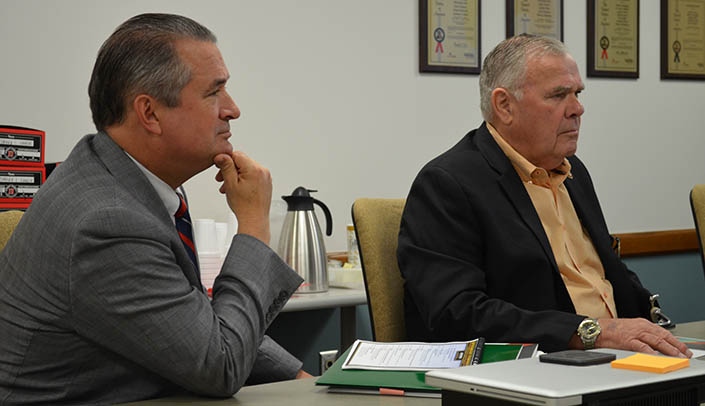Nebraska U.S. Representative Don Bacon toured UNMC Wednesday, hosting fellow congressman Jim Baird of Indiana.
Reps. Bacon and Baird were in Omaha to speak at the U.S. Strategic Command later in the day.
The congressmen took a tour of the Nebraska Biocontainment Unit and the UNMC Global Center for Health Security, led by Chris Kratochvil, M.D., associate vice chancellor for clinical research. They also attended presentations by:
- Associate Vice Chancellor for Business Development Rod Markin, M.D., Ph.D., director of UNeTech, and Tyler Scherr, Ph.D., of UNeMed on the Omaha Medical Technology Pipeline;
- Aaron Yoder, Ph.D., associate professor in the UNMC College of Public Health Department of Environmental, Agricultural & Occupational Health, on ag safety and health in Nebraska; and
- Dmitry Oleynikov, M.D., surgeon and director, Center for Advanced Surgical Technologies (CAST), and Nathan Bills, Ph.D., research projects coordinator, on surgery with robotics and its possible defense and space applications.
“I had the opportunity to show (Rep. Baird) some of the best things about Omaha,” Bacon said. “We’re so blessed with some great institutions and businesses. I wanted to come by UNMC because I’m very proud of what UNMC does, whether it’s work in cancer, research and care, or whether it’s biomedicine — there’s a long list, and I wanted to show off UNMC.”
“This was a chance to see, with this unusual year, to see all the way from Indiana to Omaha,” Baird said. “It’s (the Midwest flooding) had its impact on all of us, Indiana all the way to here. But the other side is, I’m on the science committee in Washington and the ag committee with Don, so I’m interested in all of these things.”
The congressmen also stopped at the University of Nebraska at Omaha to learn about opportunities for public-private collaboration to drive agricultural innovation and develop educational pipelines in STEM.
Dr. Bills said he was pleased for the chance to present his work to the congressmen.
“They are on the military and the NASA subcommittees in Congress, which is related to where we got our funding — both from NASA and the Department of Defense — for the development of our surgical robots.”
